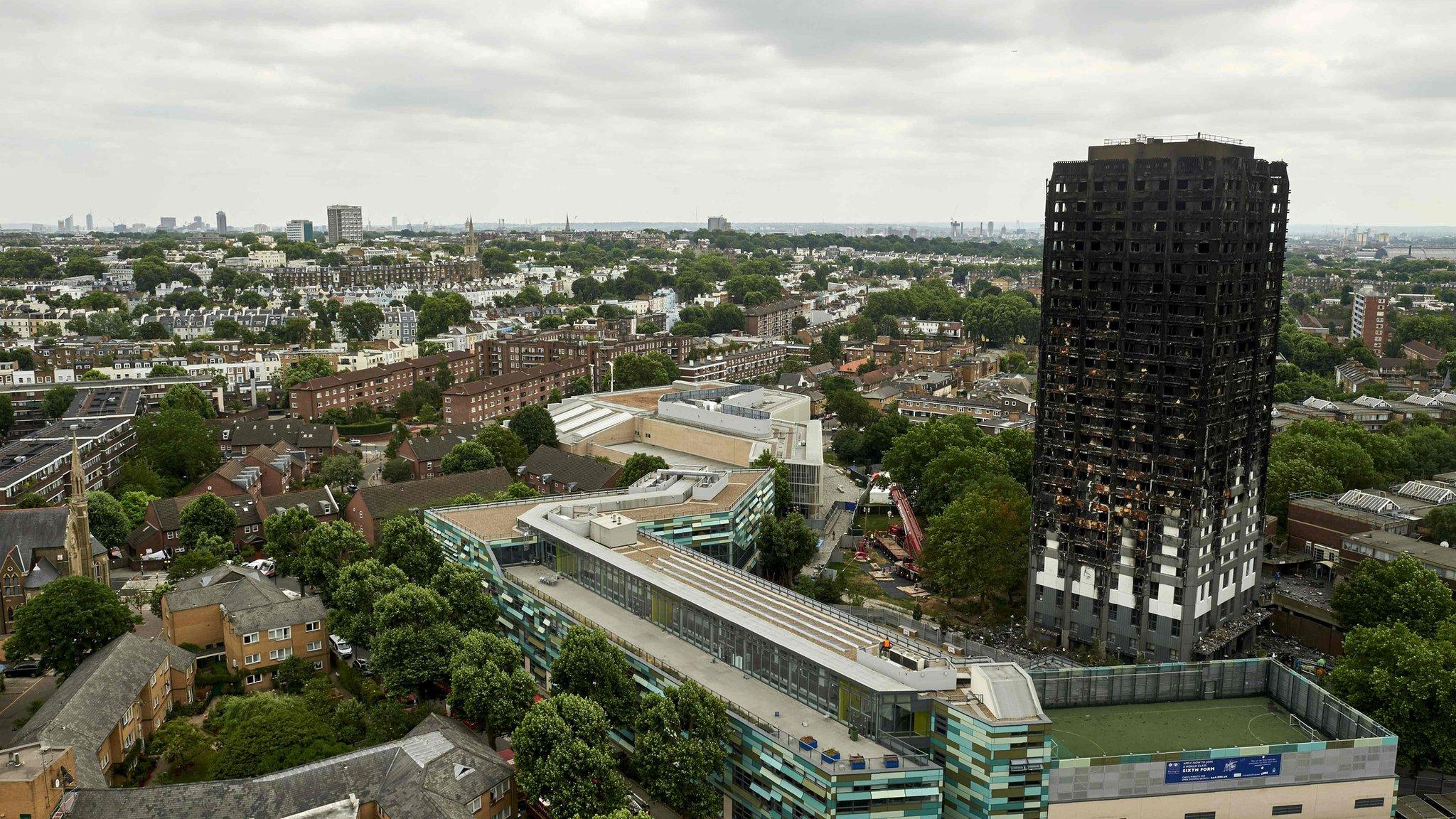Grenfell Tower: Cladding firm tells public inquiry product was misused
- Published
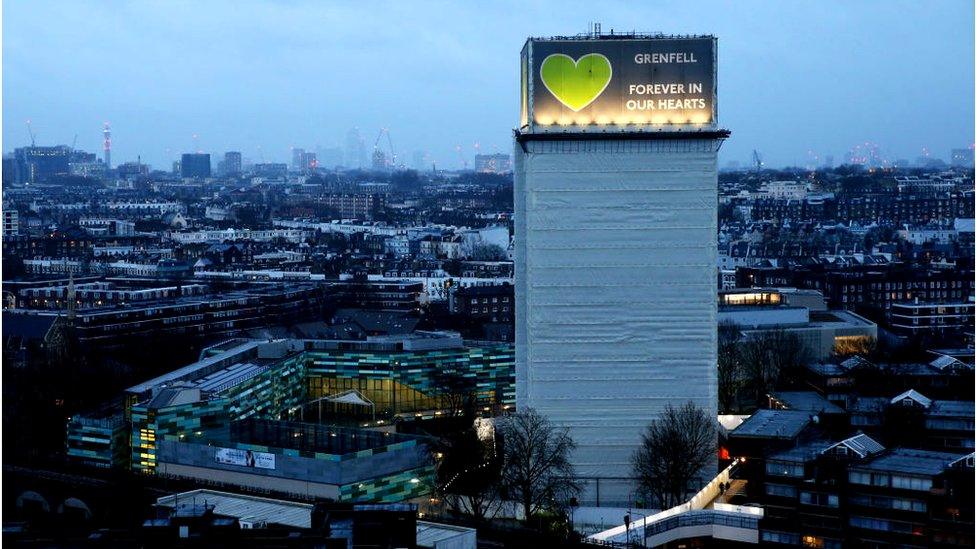
The public inquiry into the disaster has already concluded cladding accelerated the flames
The company that manufactured cladding which was blamed for spreading the Grenfell Tower fire has suggested its products were misused during the refurbishment of the building.
In a closing speech to the public inquiry, Arconic Architectural Products said the construction firm, Rydon, and contractor, Harley Facades, failed to check if the cladding was suitable.
The multinational company said if a fire assessment had been carried out during the refurbishment scheme before the fire, different cladding products would have been used.
Arconic believes other firms involved in the disaster have had an agenda to condemn the cladding company before the case has fully been heard.
The fire at the tower in north Kensington, London, which started in the kitchen of a flat on 14 June 2017, killed 72 people.
Firms involved in the disaster have been making closing statements to the inquiry, which is in its second phase.
The inquiry has heard Arconic's France-based cladding factory produced aluminium and plastic sheets, which were then cut and shaped to form Grenfell's cladding panels.
The cladding was tested in various forms years before the fire and some results suggested it performed poorly in preventing fires spreading, but this was not widely publicised.
Arconic told the inquiry it met the relevant British standard, was legal to use in the UK and was "almost identical" to the products of other manufacturers at the time.
Despite that, the inquiry has already concluded the plastic contained within the panels on the side of Grenfell Tower were the main reason the fire spread.
Stephen Hockman QC, for Arconic, argued that fire regulations for construction products applied to the way they were used in practice, rather than the way they were manufactured.
"Primary responsibility for any alleged misuse of the product must lie with those actually responsible for the design and construction of the architectural project," he told the inquiry.
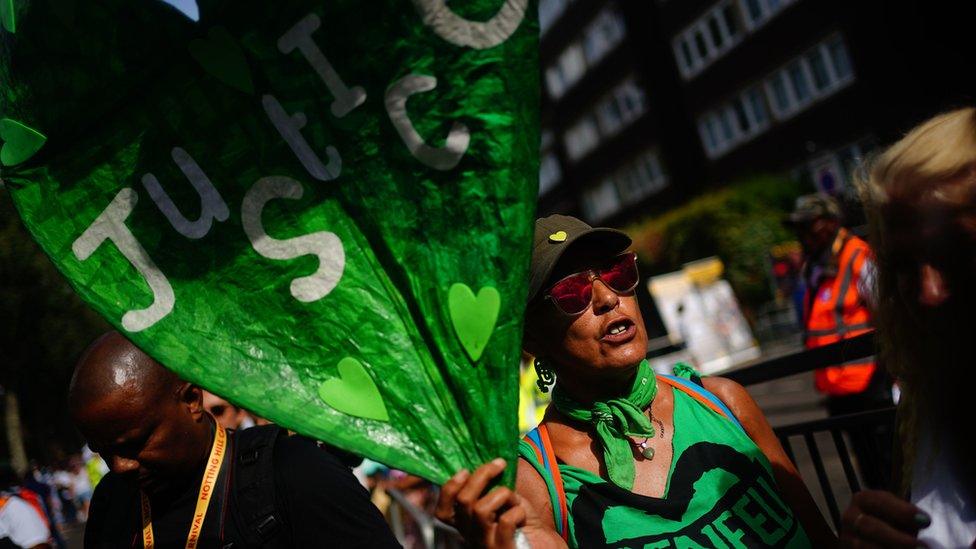
Campaigners and bereaved relatives have campaigned for "justice" for the victims since 2017
He said fire experts should have assessed the components to be used in the project, and blamed the Grenfell Tower architects Studio E, construction firm Rydon and cladding installer Harley Facades for not doing so.
Mr Hockman QC told the hearing they were instead anxious to achieve what is known as "value engineering", or cost savings, and should be held responsible.
The Reynobond PE cladding used at Grenfell was slightly cheaper than a more fire-resistant version, the hearing was told.
Arconic knew its cladding was combustible and performed poorly in a European standard test, and it has been claimed the company deliberately targeted sales in the UK, which had less restrictive safety rules than many other countries.
Having obtained worse-than-anticipated test results, Arconic has been accused of not informing the body that issues product safety certificates relied on by the construction industry, including one for the Grenfell Tower cladding.
The designers for the Grenfell Tower refurbishment decided to fit the cladding as shaped boxes known as cassettes, apparently unaware of previous Arconic testing that this design was more likely to spread fires, the inquiry heard.
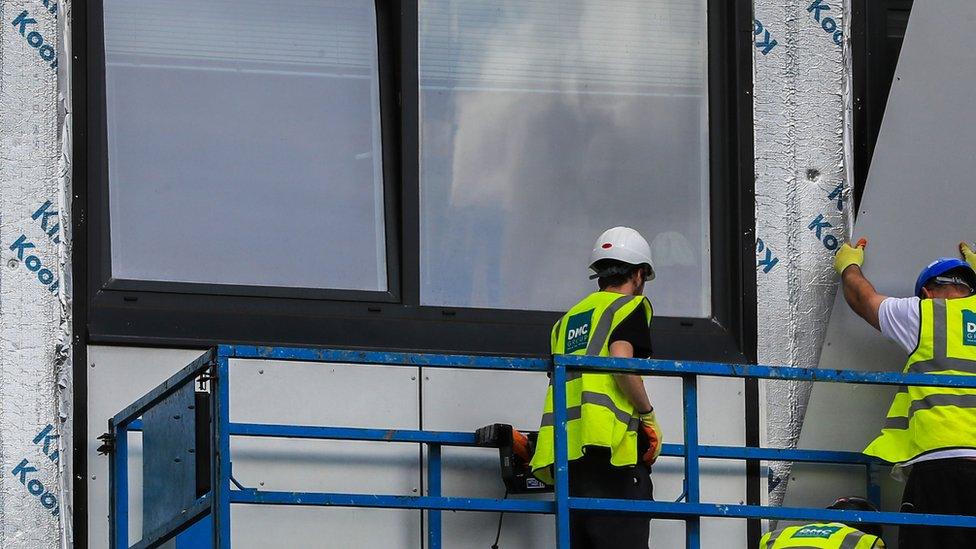
Following the Grenfell disaster, similar styles of cladding were removed from residential buildings across the country
They relied on the product safety certificate issued in the UK, the hearing was told.
But Mr Hockman said the small print of the certificate warned that "small differences in detail" in a building design might "significantly affect" the product's fire rating.
If the companies involved in the Grenfell project decided the Arconic panels were suitable regardless, "that is an approach for which they must be held responsible," he told the inquiry.
Despite that, on Monday, the inquiry heard a barrister for victims of the fire put Arconic at the top of the list of companies responsible for the use of the dangerous cladding at Grenfell.
After years of hearings, in which companies have blamed each other, the inquiry will have to decide, in its final report next year, where the balance of blame really lies.
A Metropolitan Police investigation is also carrying out similar investigations. Decisions on any prosecutions are not expected until the end of next year at the earliest, because the police want to see the inquiry's report first.
In an earlier statement, Harley Facades, which installed the cladding system, said the decision about which product to use was taken long before it took on the refurbishment job.
The company's barrister Jonathan Laidlaw KC told the inquiry the firm was a cladding contractor, not specialist consult, and relied on experts for safety advice.
"Arconic cannot simply abdicate all responsibility for the use of their products at Grenfell," he said.
"They were perfectly aware that that product in cassette form was not suitable for Grenfell Tower or indeed any other high rise building. Indeed they knew that it was dangerous in any such application.
Closing statement will be heard for the rest of the week, with the inquiry panel expected to deliver conclusions and recommendations next year.

Follow BBC London on Facebook, external, Twitter , externaland Instagram, external. Send your story ideas to hellobbclondon@bbc.co.uk, external
- Published7 November 2022
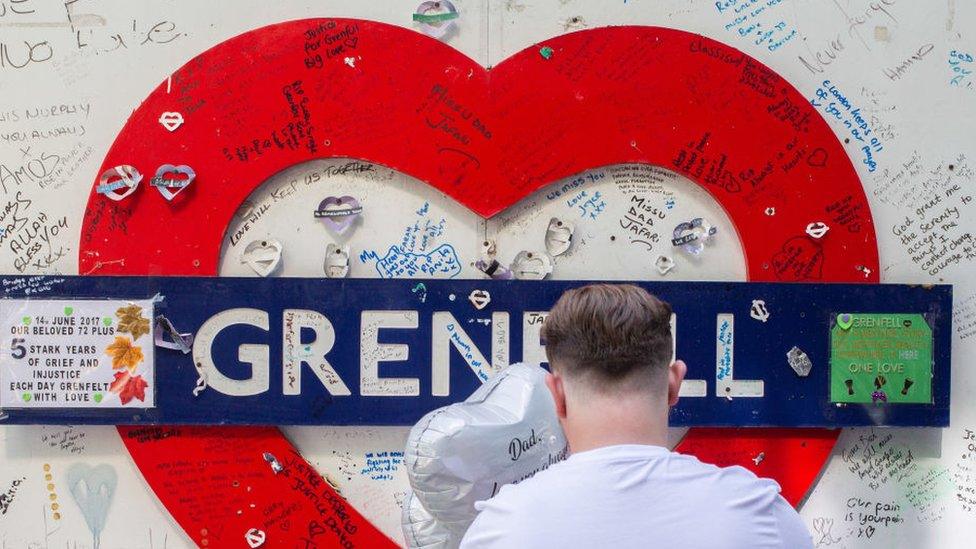
- Published21 March 2022
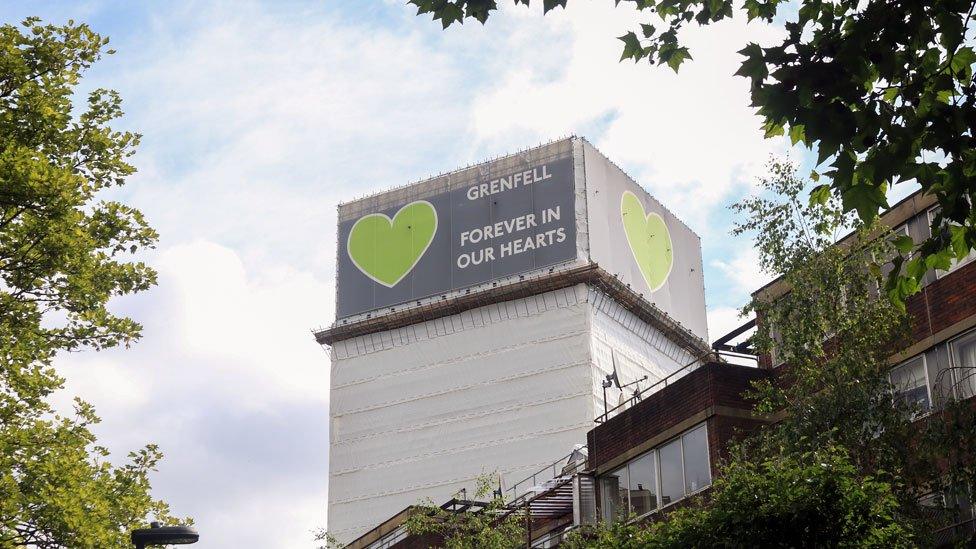
- Published16 September 2021
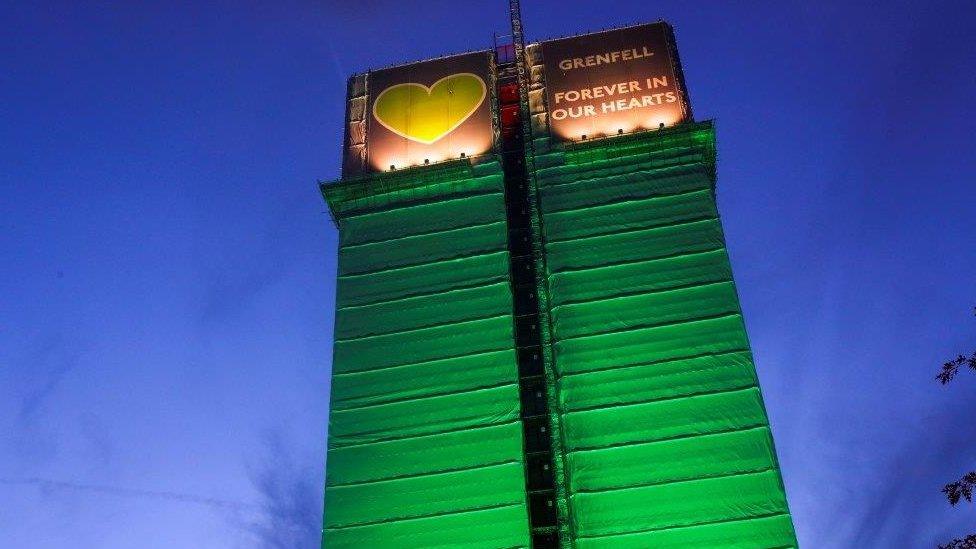
- Published23 March 2021
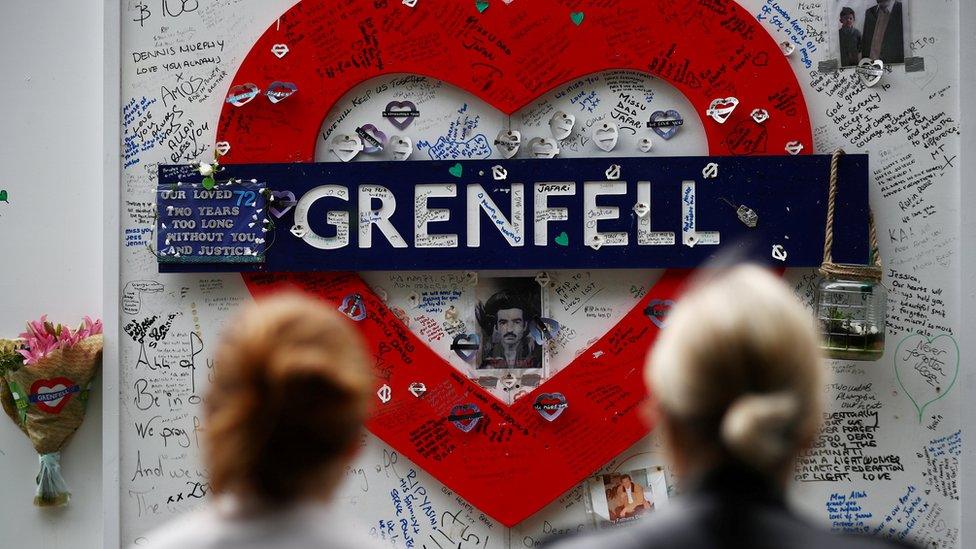
- Published25 June 2017
